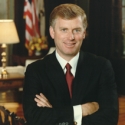 |
 |
|
|
|
Speeches |
|
|
Yokohama Symposium
April 15, 2004
[ Page 2 of 2 ]
| << Previous Page | Speeches | Next Page >> |
I most recently represented my country in the A-50 celebration of the San Francisco Treaty. Prime Minister Koizumi represented Japan at this important anniversary ceremony. In 1990, I represented the President in the celebration of the coronation of the Emperor. It was my honor to represent the United States at the 30th anniversary celebration of the reversion of Okinawa to Japan in 1992. Since leaving office in 1993 I have visited Japan 4-5 times each year to maintain friendships developed with Japanese political, diplomatic and business leaders. I will continue to visit here often because I simply like the Japanese people, and I also firmly believe that the US-Japan relationship will continue to be critical to maintaining the security and prosperity of the entire Pacific region. My country and your country have clearly benefited from the process of change started by Commodore Perry and the Japanese Commissioners. In 1853 and 1854 these men of wisdom and courage propelled us forward toward the warm and powerful relationship that Japan and the United States enjoy today.
After 150 years of storied history, I am proud to say the US-Japan security relationship has never been stronger. Though Japan has had a decade of low economic growth, signs of recovery appear everywhere. Unfortunately, however, great nations such as Japan and the United States cannot rest on their laurels. There is always another challenge. The Al Qaeda terrorists have attacked us without provocation. Whether we like it or not, Japan and the US have been presented with new challenges and demands that will require new sacrifices. This is why the United States and Japan and other allies are standing shoulder-to-shoulder in Afghanistan and Iraq.
Terrorism has two chief characteristics: its unpredictability and the way it uses force so wantonly against defenseless civilians. A third characteristic is that terrorists seek soft targets. They perceived the US as a soft target in 2001. They struck a soft target in Bali in 2002, and, more recently, in Spain they have struck another soft target, not once but twice, in quick succession. This is why the US and Japan must stick together and take the offensive against the terrorists wherever they may be.
There are many difficult and dangerous days ahead of us in Iraq and Afghanistan and in the wider war on terrorism. Regardless of how long it takes and regardless of the cost, the United States and Japan must prevail in this struggle because the quality of the lives of our children, and even their children, depend on the outcome. Terrorism cannot be allowed to win, not now, and not ever. Japan and the United States together must create a free and tolerant world in which intellectual ideas, political philosophies, and commercial goods can all circulate freely without the fear that bombs or gas attacks can deprive us and our children of these fundamental freedoms.
In closing, let us look back over the last 150 years. What seemed impossible in March of 1854 has happened. A young America has become more mature and a pre-industrial Japan has become a model for rapid modernization. Best of all, in spite of the difficulties we have had, we have not only learned to work together, but in addition we have also become genuine friends. Together we have created unprecedented wealth. Together we not only preach democracy, we practice it. Japan and the United States have moved a very long way over the last 150 years toward creating political social systems that are tolerant, democratic, and dynamic.
We are true global partners, and I salute the people of Japan for their continuing contributions to spreading democracy, prosperity, and tolerance around the globe. Commodore Perry and the Japanese Commissioners at Kanagawa started a process of change that we, as their descendants, are now extending to an ever-increasing proportion of mankind. One hundred fifty years from now other Americans and other Japanese will come here to judge how we, the citizens of the early 21st century, met the challenges of our time. What will they say about us? I trust they will say that Japan and America not only met the challenges but that they met them together.
Thank you.
[ Page 2 of 2 ]
| << Previous Page | Speeches | Next Page >> |